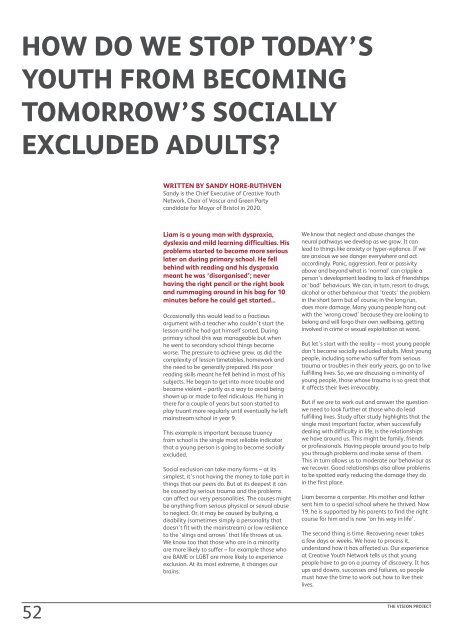The Vision Project
Throughout 2019, Developing Health & Independence (DHI), have been marking their 20th anniversary as a charity by looking to the future. Through articles, events and podcasts, they've asked people to answer the question of how we can achieve their vision of ending social exclusion. This collection of articles includes the contributions of experts from across public life and the political spectrum.
Throughout 2019, Developing Health & Independence (DHI), have been marking their 20th anniversary as a charity by looking to the future. Through articles, events and podcasts, they've asked people to answer the question of how we can achieve their vision of ending social exclusion. This collection of articles includes the contributions of experts from across public life and the political spectrum.
Create successful ePaper yourself
Turn your PDF publications into a flip-book with our unique Google optimized e-Paper software.
HOW DO WE STOP TODAY’S<br />
YOUTH FROM BECOMING<br />
TOMORROW’S SOCIALLY<br />
EXCLUDED ADULTS?<br />
WRITTEN BY SANDY HORE-RUTHVEN<br />
Sandy is the Chief Executive of Creative Youth<br />
Network, Chair of Voscur and Green Party<br />
candidate for Mayor of Bristol in 2020.<br />
Liam is a young man with dyspraxia,<br />
dyslexia and mild learning difficulties. His<br />
problems started to become more serious<br />
later on during primary school. He fell<br />
behind with reading and his dyspraxia<br />
meant he was ‘disorganised’; never<br />
having the right pencil or the right book<br />
and rummaging around in his bag for 10<br />
minutes before he could get started...<br />
Occasionally this would lead to a fractious<br />
argument with a teacher who couldn’t start the<br />
lesson until he had got himself sorted. During<br />
primary school this was manageable but when<br />
he went to secondary school things became<br />
worse. <strong>The</strong> pressure to achieve grew, as did the<br />
complexity of lesson timetables, homework and<br />
the need to be generally prepared. His poor<br />
reading skills meant he fell behind in most of his<br />
subjects. He began to get into more trouble and<br />
became violent – partly as a way to avoid being<br />
shown up or made to feel ridiculous. He hung in<br />
there for a couple of years but soon started to<br />
play truant more regularly until eventually he left<br />
mainstream school in year 9.<br />
This example is important because truancy<br />
from school is the single most reliable indicator<br />
that a young person is going to become socially<br />
excluded.<br />
Social exclusion can take many forms – at its<br />
simplest, it’s not having the money to take part in<br />
things that our peers do. But at its deepest it can<br />
be caused by serious trauma and the problems<br />
can affect our very personalities. <strong>The</strong> causes might<br />
be anything from serious physical or sexual abuse<br />
to neglect. Or, it may be caused by bullying, a<br />
disability (sometimes simply a personality that<br />
doesn’t fit with the mainstream) or low resilience<br />
to the ‘slings and arrows’ that life throws at us.<br />
We know too that those who are in a minority<br />
are more likely to suffer – for example those who<br />
are BAME or LGBT are more likely to experience<br />
exclusion. At its most extreme, it changes our<br />
brains.<br />
We know that neglect and abuse changes the<br />
neural pathways we develop as we grow. It can<br />
lead to things like anxiety or hyper-vigilance. If we<br />
are anxious we see danger everywhere and act<br />
accordingly. Panic, aggression, fear or passivity<br />
above and beyond what is ‘normal’ can cripple a<br />
person’s development leading to lack of friendships<br />
or ‘bad’ behaviours. We can, in turn, resort to drugs,<br />
alcohol or other behaviour that ‘treats’ the problem<br />
in the short term but of course, in the long run,<br />
does more damage. Many young people hang out<br />
with the ‘wrong crowd’ because they are looking to<br />
belong and will forgo their own wellbeing, getting<br />
involved in crime or sexual exploitation at worst.<br />
But let’s start with the reality – most young people<br />
don’t become socially excluded adults. Most young<br />
people, including some who suffer from serious<br />
trauma or troubles in their early years, go on to live<br />
fulfilling lives. So, we are discussing a minority of<br />
young people, those whose trauma is so great that<br />
it affects their lives irrevocably.<br />
But if we are to work out and answer the question<br />
we need to look further at those who do lead<br />
fulfilling lives. Study after study highlights that the<br />
single most important factor, when successfully<br />
dealing with difficulty in life, is the relationships<br />
we have around us. This might be family, friends<br />
or professionals. Having people around you to help<br />
you through problems and make sense of them.<br />
This in turn allows us to moderate our behaviour as<br />
we recover. Good relationships also allow problems<br />
to be spotted early reducing the damage they do<br />
in the first place.<br />
Liam became a carpenter. His mother and father<br />
sent him to a special school where he thrived. Now<br />
19, he is supported by his parents to find the right<br />
course for him and is now ‘on his way in life’.<br />
<strong>The</strong> second thing is time. Recovering never takes<br />
a few days or weeks. We have to process it,<br />
understand how it has affected us. Our experience<br />
at Creative Youth Network tells us that young<br />
people have to go on a journey of discovery. It has<br />
ups and downs, successes and failures, so people<br />
must have the time to work out how to live their<br />
lives.<br />
52<br />
THE VISION PROJECT




